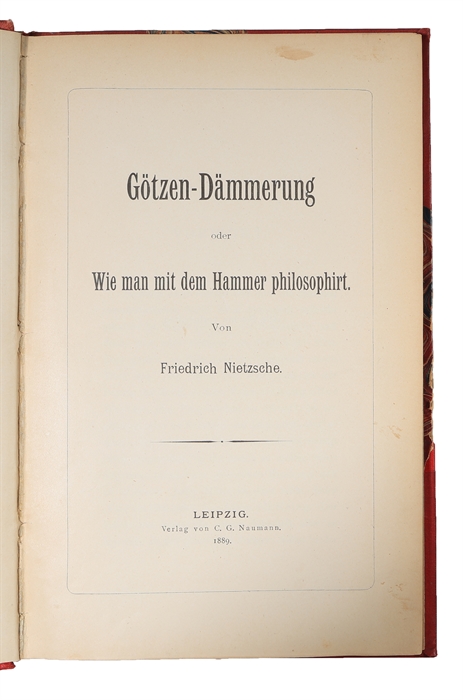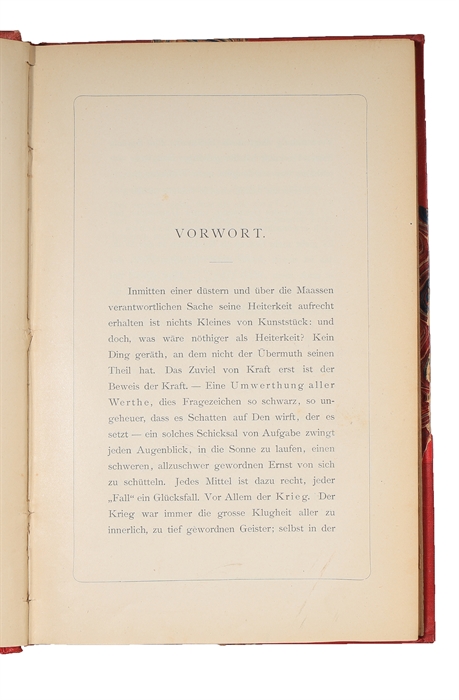WHAT DOES NOT KILL ME ONLY MAKES ME STRONGER
NIETZSCHE, FRIEDRICH
Götzen-Dämmerung oder Wie man mit dem Hammer philosophiert.
Leipzig, C.G. Naumann, 1889.
8vo. Bound in a contemporary red half cloth binding with red marbled paper over boards and single gilt lines. Gilt lettering and a single gilt ornamentation to spine. Lovely patterned irdiscent end-papers in blue with white flowers. Boards slightly faded at top. Front hinge a bit soiled. Spine a bit discoloured and a bit worn at capitals. A few leaves with light, scattered brownspotting, but overall very clean and fresh. A few minor pencil marks on several pages and some faint brown spots on the final page. (8), 144 pp.
First edition, published in 1889 from Nietzsche's private press, of the epitome of Nietzsche's final project -a re-valuation of all values ("Eine Umwerthung aller Werthe"), -his hugely interesting "declaration of war" (preface p. (4): "Diese Schrift ist eine grosse Kriegserklärung"), which was written during his last productive year, just before his big breakdown in Turin. "Götzen-Dämmerung" ("The Twilight of the Idols") arguably constitutes the culmination of the production of this giant of philosophy, who turned mad after having finished it.
Early in 1889, Nietzsche began to exhibit signs of serious mental illness; in Turin, he finally broke down and was brought back to Basel by his friends. "The Twilight of the Idols" was released merely a few weeks after this collapse, and Nietzsche never wrote again.
Nietzsche had 1.000 copies of the work privately printed. The work is considered one of his most popular, and it is here that we find some of the most frequently quoted passages from the works of Nietzsche, e.g. "What does not kill me, only makes me stronger" (p.2.: "Was mich nicht umbringt, macht mich stärker").
The Twilight was meant as an introduction to, or summary of, Nietzshe's philosophy, and as such it is one of his most interesting works. It is written almost as in a rage of fever - it took him no more than a week to write it -, and he regarded it a world-changing magnum opus. As he states at the end of the preface: "Turin, am 30. September 1888, am Tage, da das erste Buch der Umwerthung aller Werthe zu ende kam." (i.e. "Turin, on September 30. 1888, on the day that the first book on the re-valuation of all value came to an end.").
This highly polemical work makes clear reference to Wagner's opera "Götterdämmerung", and it presents us with a sharp critique of the most influential philosophers in history, e.g. Kant and Plato, and of Christianity in general, but also the likes of Rousseau, Hugo, Renan, Mill, Darwin, Dante etc. are attacked as the causes of cultural decadence in Europe. Giants like Caesar, Napoleon, Dostojevski, Goethe, and Thukydides are considered representatives of the opposite.
The mental collapse of the author may not come as a surprise to anyone reading the work.
Of the 1.000 copies, 659 still remained unsold by October 1893.
Twilight of the Idols: Schaberg: 56a
Order-nr.: 61353



